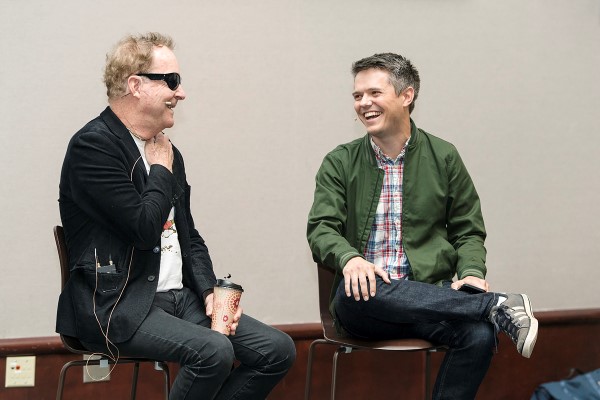
Fred Schneider of The B-52s (left) speaks with Dave Paulson at MTSU. Photo by Andy Heidt.
“The more we played, the more people wanted to see us,” frontman Fred Schneider said about the B-52s’ career during a Q & A session held at Middle Tennessee State University on Sept. 29.
According to Schneider, the B-52s’ breakthrough success 40 years ago was largely due to college radio and alternative music fans.
“Our management didn’t understand it [the music], our record company didn’t get it, Top 40 radio didn’t get it,” Schneider told Tennessean music reporter Dave Paulson about the band’s eclectic catalog and its first single, “Rock Lobster,” released via DB Records in 1978 and again the following year on the band’s eponymous debut album. “Alternative radio and college radio, as they still do, embraced it.”
The B-52s were established in Athens, Ga., in 1976, with Schneider, Kate Pierson, Keith Strickland and siblings Cindy and Ricky Wilson. The band soon performed wherever they were allowed to and eventually traveled to New York City to play at various venues, including the renowned nightclub CBGB’s.
“No one was the leader of the group because we would rebel if any of us tried,” Schneider said. “We shared everything equally . . . the writing, the money we made, which wasn’t much at the time.”
Although the group temporarily disbanded in the mid-’80s following bandmate Ricky Wilson’s death from AIDS, the band reunited in 1989 with its multi-platinum-selling comeback record, Cosmic Thing, which featured the band’s biggest hit, “Love Shack.”
“It almost wasn’t a hit,” Schneider said. “I just insisted. . . . I thought it would be our biggest hit ever.”
Top 40 radio didn’t show interest in the track at first, he says, but it wasn’t long before stations across the country followed college radio’s lead.
“Don’t try to do stuff that fits in with what’s going on because it won’t be popular in a year or two,” Schneider told the audience, most of which were recording industry students. “Our songs don’t date because we’re not trying to sound like anybody.”
Schneider, who still tours with Pierson and Wilson, said the band’s prolonged success most likely stems from its loyal fan base and its members’ freedom to make their own choices over the past four decades.
“We’re crazy,” Schneider said, laughing. “We’ve always done what we want, and we didn’t let anyone tell us otherwise.”













